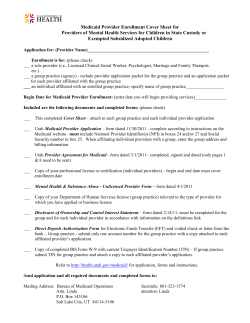
A Tale of Two States: Decisions about Extending Medicaid Can
IA Medicaid MO Twenty-two states have chosen not to extend Medicaid to more low-income adults, while residents of states that have expanded Medicaid enjoy the peace of mind that comes with having health coverage. We compare the health care stories of two women who live in neighboring states, Missouri and Iowa. Their stories show the real-life differences between having health insurance and living without it. A Tale of Two States: Decisions about Extending Medicaid Can Drastically Affect Residents’ Lives Two health care consumers from Families USA’s story bank shared their stories for this brief. This brief compares the stories of two women in neighboring states, Missouri and Iowa. These stories show the real-life impacts of state decisions to either expand health coverage or reject that expansion. States have taken very different paths when deciding whether to extend health coverage to more low-income residents. To date, Missouri’s lawmakers have rejected Medicaid expansion, leaving federal dollars on the table—and leaving more than 250,000 Missourians without an option for affordable health insurance.1 In contrast, neighboring states, including Arkansas, Illinois, Iowa, and Kentucky, made a different decision, opting to use federal funds to extend Medicaid and help hundreds of thousands of residents. Spotlight Missouri: Working Hard but Uninsured But when we look beyond the numbers, we see that these decisions can dramatically affect the lives of real people. Expanding access to affordable health care can improve people’s lives significantly—in some cases, it’s the difference between living a normal life and one of chronic pain. ISSUE BRIEF / APRIL 2015 Thirty-five-year-old Cape Girardeau, Missouri, resident Echo Garrett lost her job at a call center in 2013. Today, she works part-time at a fast food chain making minimum wage with no health benefits. Like Echo, most of those who could benefit if Missouri extended Medicaid (60 percent) are working.2 Echo is trying hard to make ends meet, but chronic health conditions—asthma and severe knee pain from osteoarthritis—make it even more difficult. In September, she had to take three weeks off work due to severe knee pain that made it impossible for her to do her job. Because she lives in Missouri, where lawmakers have decided not to extend Medicaid, Echo—who is WWW.FAMILIESUSA.ORG single and doesn’t have children—has no options for affordable health insurance. Missouri’s current Medicaid program doesn’t cover non-disabled adults without dependent children, no matter how low their income.3 Furthermore, Echo doesn’t make enough to qualify for help with marketplace insurance,4 leaving her behind in the coverage gap. Without health insurance, Echo can’t afford the care she needs to make it easier for her to work. If Echo lived just one state over in Iowa, her story might be very different. Fortunately, Missouri lawmakers can still opt to extend Medicaid, providing coverage to adults with incomes up to 138 percent of poverty ($27,724 for a family of three) with the federal government paying nearly all of the costs.5 Spotlight Iowa: Extending Coverage Helps Residents In Lake View, Iowa, 55-year-old Deb Stehr, a single mother caring for her disabled son, finally got health coverage in 2014 after Iowa extended its Medicaid program. She had been uninsured for 37 years. Deb has worked as a waitress and as a self-employed consultant for nonprofits. She did not get health coverage through any of these jobs. In 2004, her consulting work was winding down, and she became a full-time caregiver for her son. Deb’s son has had Medicaid coverage because of his disability. And in her job as her son’s caregiver, Deb is paid by Medicaid. But until Iowa extended Medicaid in January 2014, she wasn’t eligible for the program herself. Before 2014, Iowa’s Medicaid eligibility level for parents with dependent children was below the poverty level,6 like Missouri’s. Snapshot Deb’s Medicaid coverage began in July 2014. She described having health insurance as “a relief” when she needed to go to the emergency room for treatment of an infected animal bite. She could get the care she needed and not have to worry that the cost would be a financial burden. Having Medicaid also means Deb can afford her blood pressure medicine and stay healthy so she can continue caring for her son. Echo Garrett Cape Girardeau, Missouri In States that Extend Medicaid, Health Coverage Brings Residents Peace of Mind Work: Fast food chain Deb says she was lucky to have good health during the 37 years she didn’t have insurance. She remains in good health, and now that she has Medicaid, she doesn’t have to worry that a health problem will wipe her out financially. Deb can focus on taking care of her son and knows that if she gets sick, she’s covered. That stands in stark contrast to Echo’s situation. Echo can’t afford the care she needs that could improve her health: Even though she has constant knee pain, she is hesitant to see a doctor because of the cost. She has trouble managing her asthma because she can’t afford to see a doctor or buy the most effective medication. She makes monthly payments for orthopedic care she received in the past, but she hasn’t continued that care due to worries about cost. Age: 35 Household: Single, no children Health: Asthma, osteoarthritis Health Insurance: No Echo lives in Missouri, where lawmakers have decided not to extend Medicaid. Because she is single and doesn’t have children, she has no options for affordable health insurance. “I’m in pain all the time,” says Echo. “But I just have to learn to deal with it.” A TALE OF TWO STATES: DECISIONS ABOUT EXTENDING MEDICAID CAN DRASTICALLY AFFECT RESIDENTS’ LIVES 2 If Echo lived in Iowa instead of Missouri, she would be able to get Medicaid, see an orthopedist, take steps to treat her knees, and have regular access to effective asthma medication. She would be able to get healthy and afford regular check-ups so she could stay healthy. If she lived in Iowa, Echo would be able to get the care she needs to make working easier and build a better life for herself. them struggling, or closing. That was the fate of Sac-Osage Hospital in Osceola, which closed its hospital operations in September 2014.9 »» It would free up state funds for other uses. The state covers some of the uncompensated care hospitals provide. Extending Medicaid would give more people insurance, so the state could spend less on uncompensated care. If Missouri had extended Medicaid in 2014 when Iowa did, it would have saved an estimated $385 million in uncompensated care costs by 2022,10 freeing up state money for other priorities. “It would just give me peace of mind to have insurance and know that I can take care of my health,” Echo said. Extending Coverage Would Move Missouri—and Missourians—Forward If Missouri extended Medicaid, it would be easier for Echo and tens of thousands of other Missourians to stay healthy, keep working, get ahead, and have financial security. It would also bring economic benefits to the state. Here are four key ways that extending Medicaid would help Missouri’s economy: »» It would produce more jobs. New federal dollars would come into Missouri and create an estimated 23,868 jobs from 2015 to 2022, resulting in $9.9 billion in cumulative wages.7 »» It would strengthen the health care system. The state’s decision not to extend Medicaid is projected to cost Missouri hospitals $6.8 billion in lost revenue from 2013 through 2022.8 That’s because hospitals often cannot get paid when they treat uninsured patients. That uncompensated care hurts hospitals’ bottom line and can leave »» It would be good for business. Sixty percent of the uninsured Missourians who could benefit if the state extended Medicaid are working, like Echo.11 Expanding workers’ access to health care would mean a healthier, more productive workforce. It Is up to Missouri Lawmakers to Extend Health Coverage to More Residents Missouri lawmakers can vote to accept federal funds to extend Medicaid at any time—they just need the political will to do so. “There are hard-working Missourians like me trying to keep their head above water to make ends meet, and it’s not fair we can’t get health insurance,” says Echo. “I’m not looking for a handout. I just want to have insurance to take care of myself and continue working.” A TALE OF TWO STATES: DECISIONS ABOUT EXTENDING MEDICAID CAN DRASTICALLY AFFECT RESIDENTS’ LIVES Snapshot Deb Stehr Lake View, Iowa Age: 55 Household: Single mother, disabled son Work: Caregiver Health: High blood pressure Health Insurance: Yes Deb described having health insurance as “a relief” when she needed to go to the emergency room for treatment of an infected animal bite. 3 Endnotes Publication ID: MCD042915 1 Estimated number of Missourians with incomes below the poverty 6 Prior to extending Medicaid, Iowa Medicaid covered adults with level without an option for affordable health coverage. Stan Dorn et dependent children only if their income was below 80 percent of al., In States that Don’t Expand Medicaid, Who Gets New Coverage poverty. Assistance under the ACA and Who Doesn’t? (Washington: Robert Wood Johnson Foundation and the Urban Institute, October 2014), available online at http://www.rwjf.org/en/research-publications/ find-rwjf-research/2014/10/in-states-that-don-t-expand-medicaid-who-gets-new-coverage-assi.html. 2 Dee Mahan et al., Medicaid Expansion in Missouri: Health Insurance for Working Individuals and Families (Washington: Families USA, April 2014), available online at http://familiesusa.org/sites/default/ files/product_documents/MCD_Missouri%20Medicaid%20gap%20 and%20employment_final_web_V2.pdf. 3 Today, Missouri Medicaid covers qualifying low-income children, parents with dependent children, people with disabilities, and seniors. Adults without dependent children are not eligible. 4 Advance tax credits for marketplace coverage are available only to individuals with incomes at 100 percent of poverty and higher. 5 The federal government will pay 100 percent of Medicaid expansion costs from 2014 through 2016, declining to 90 percent in 2020, where it stays. In Missouri’s standard Medicaid program, the federal share is 64 percent. 7 Missouri Economic Research and Information Center (MERIC), The Economic Impact of Medicaid Expansion, February 2014, available online at http://www.missourieconomy.org/medicaidreport.pdf. 8 Stan Dorn, What Is the Result of States Not Expanding Medicaid? This publication was written by: Dee Mahan, Director of Medicaid Advocacy, Families USA Andrea Callow, Medicaid Policy Analyst, Families USA The following Families USA staff contributed to the preparation of this material (listed alphabetically): (Washington: Robert Wood Johnson Foundation and the Urban Airrion Andrews, Communications Project Manager Institute, August 2014), available online at http://www.urban.org/ David Lemmon, Director of Communications UploadedPDF/413192-What-is-the-Result-of-States-Not-Expanding- Evan Potler, Art Director Medicaid.pdf. Talia Schmidt, Editor 9 Terry Weiss, Commentary: Not Expanding Medicaid Is Hurting Ingrid VanTuinen, Director of Editorial Missouri Rural Hospitals, St. Louis Public Radio, November 19, 2014, Minda Littman, Design Consultant available online at http://news.stlpublicradio.org/post/commentarynot-expanding-medicaid-hurting-missouri-rural-hospitals. 10 John Holahan et al., The Cost and Coverage Implications of the Medicaid Expansion: National and State-by-State Analyses (Washington: Kaiser Family Foundation, November 2012), available online at https://kaiserfamilyfoundation.files.wordpress. com/2013/01/8384.pdf. 11 Dee Mahan et al., op cit. A selected list of relevant publications to date: Medicaid Expansion Helps Low-Wage Workers (February 2015) Expanding Medicaid: 22-State Data on Populations That Stand to Benefit (March 2015) How to Create a Successful Story Bank Program (March 2015) Funding for this project was provided in whole by The Missouri For a more current list, visit: www.familiesusa.org/publications Foundation for Health. The Missouri Foundation for Health is a 1201 New York Avenue NW, Suite 1100 Washington, DC 20005 202-628-3030 info@familiesusa.org www.FamiliesUSA.org facebook / FamiliesUSA twitter / @FamiliesUSA philanthropic organization whose vision is to improve the health of the people in the communities it serves. © Families USA 2015
© Copyright 2025









